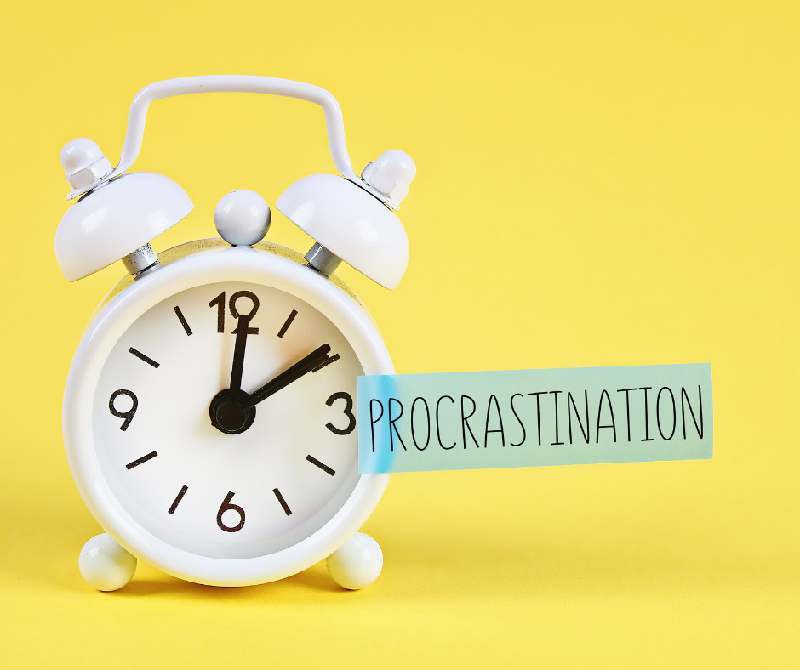
We’ve all done it – put off until tomorrow what we can do today. Which is relatively harmless until you run out of time to get the job done or you cross a deadline. When it comes to financial matters crossing a deadline more often than not leaves you with a penalty fine and interest to pay.
Why do we procrastinate?
Procrastination is defined as the act of putting off or delaying tasks until last minute or past their due date. It can be misinterpreted as lazy but they aren’t the same. If you’re lazy, you’re voluntarily unwilling to make the effort. Procrastination involves a bit more thinking – you’re doing one thing when you know you should be doing something else.
The science behind why we procrastinate is really interesting (well, to the team at Accounting Clarkes it is!) – it’s all about ‘time inconsistency’. As humans we subconsciously place a higher value on the present rather than the future. This means we’ll seek instant gratification from a reward we can receive today even if the reward we receive in the future is even better.
Let’s give our example an accountancy twist.
It’s the first day of January and top of your to do list is your self-assessment tax return. You know it’s due to be filed and any tax paid for by 31st January. Even though you understand the deadline and the amount of work you need to put in to completing your tax return, you still spend the next few weeks finding other ‘more important’ things to do. These tasks aren’t actually as important as completing your tax return on time, but you experience that reward trigger sooner.
The different types of procrastinator
Did you know there are six different types of procrastinators? Here they are:
- The perfectionist
This person finds it hard to accept their work is complete because they want everything to be perfect. Their standards are so high they avoid completing tasks for fear of being judged as substandard.
- The dreamer
This person is easily bored and needs lots of variety to keep focused. They will underestimate how long a task will take.
- The worrier
This person’s procrastination is driven by their fear – which can be of failure as well as success. Heard of ‘imposter syndrome’? That’s another trait of the worrier.
- The defier
This person likes to be in control of situations and doesn’t like being told what to do (even by themselves). They feel hard done by that their time has to be spent on such tasks.
- The crisis-maker
This person believes they work better under pressure so will push tasks up to their deadline as much as possible. They get a buzz from working in this way even through they end up rushing tasks.
- The over-doer
This person finds it hard to say no to things and then ends up overwhelmed by the amount of work they have to do.
Can you relate to any of these procrastinator personality types?
How to avoid procrastinating
Each type of procrastinator would need to tackle their procrastination in a different way however there are some general rules to help you avoid procrastinating.
- Set smaller tasks which bring shorter-term reward
Big tasks can feel overwhelming and the end reward too far away. If you can break a task down into smaller steps, you’ll receive that hit of dopamine quicker and more frequently.
- Organise your tasks
As well as breaking down tasks, have a clear timetable and view on what those smaller deadlines should be. It will help you keep motivated when you see the progress on a weekly and monthly progress and how it all comes together.
- Remove distractions
This is probably the biggest influence on how we procrastinate! Think about what distracts you. Is it email notification pop ups? Having your phone on your desk? Social media too easy to access? Once you know, it’s time to take those distractions away from where you’re working.
- Don’t be too hard on yourself
We all have periods of procrastination – we’re only human! So if you find your mind has wondered to something less important or off-task, accept that’s what’s happened. Punishing yourself or being mad you weren’t focused enough is unlikely to get you back into the right mindset. Finish what you’re doing (if it’s quick to complete) or take a break and then review your priorities with a fresh perspective.
If you’d like more tips on how to kick the procrastination habit, we like this article by James Clear.
Join in our conversation on LinkedIn or Facebook on procrastination, feel free to share tips you’ve found helpful when you’ve been easily distracted.